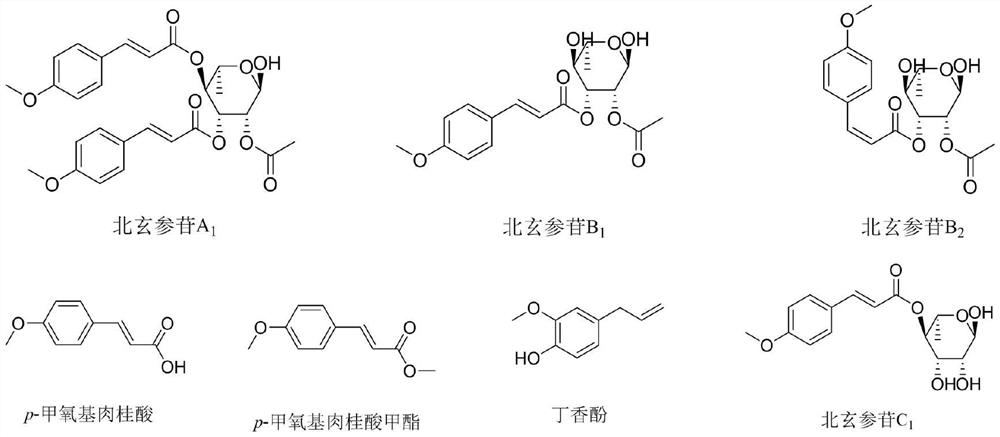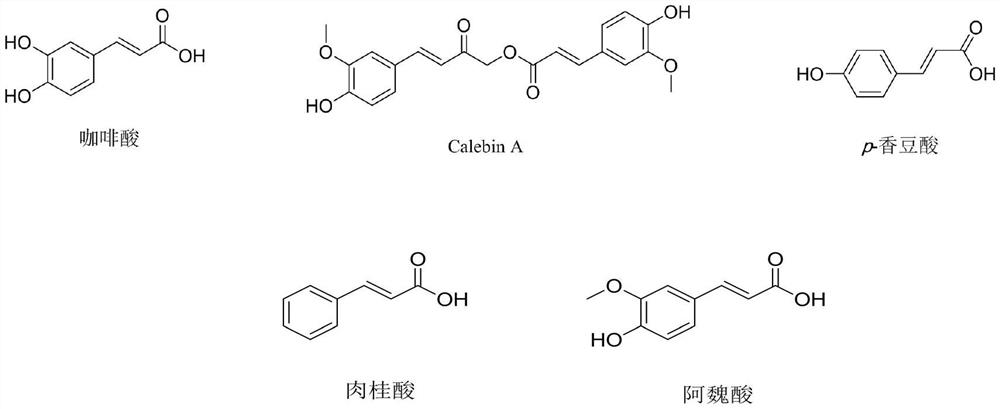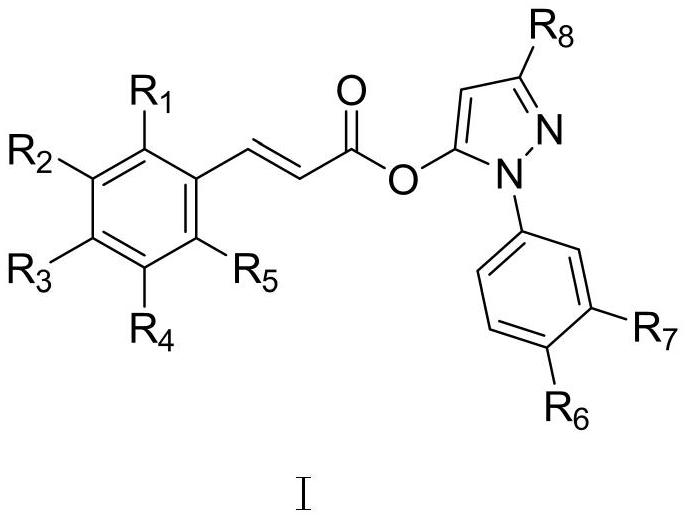Phenylacrylate Derivatives and Their Use as Neuroprotective Drugs
A technology of phenylacrylate derivatives, which is applied in the field of phenylacrylate derivatives, can solve the problems of unstable physical and chemical properties, low oral bioavailability, and can only be administered by injection, and achieve ideal pharmacokinetic characteristics and neuroprotective effects The effect of high activity and low acute toxicity
- Summary
- Abstract
- Description
- Claims
- Application Information
AI Technical Summary
Problems solved by technology
Method used
Image
Examples
Embodiment 1
[0037] Example 1 (E) Preparation of 3-methyl-1-phenyl-1H-pyrazole-5-(3-(4-hydroxyphenyl))acrylate (T-1)
[0038] 4-Hydroxyphenylacrylic acid (5 mmol, 1.0 eq) was dissolved in 40 mL of dichloromethane at room temperature. Oxalyl chloride (6.5 mmol, 1.3 eq) was slowly added dropwise to the solution at 0-5°C. After the dropwise addition was completed, the reaction was moved to room temperature for 8h. After the reaction was completed, vacuum drying was performed to obtain 4-hydroxyphenylacryloyl chloride.
[0039]At room temperature, phenylhydrazine hydrochloride (7.5 mmol, 1.0 eq) and triethylamine (11.3 mmol, 1.5 eq) were dissolved in 20 mL of absolute ethanol. The reaction solution was heated to 50°C, and ethyl acetoacetate (7.5 mmol, 1.0 eq) was slowly added dropwise. After the dropwise addition was completed, the reaction was refluxed for 24 hours. After the reaction was completed, vacuum drying was performed to obtain 3-methyl-1-phenyl-2-pyrazolin-5-one.
[0040] 3-Met...
Embodiment 2
[0042] Example 2 (E)-3-methyl-1-phenyl-1H-pyrazole-5-(3-(4-hydroxy-3-methoxyphenyl))acrylate (T-2) and its Preparation of salt
[0043] 4-Hydroxy-3-methoxyphenylacrylic acid (5 mmol, 1.0 eq) was dissolved in 40 mL of dichloromethane at room temperature. Oxalyl chloride (6.5 mmol, 1.3 eq) was slowly added dropwise to the solution at 0-5°C. After the dropwise addition was completed, the reaction was moved to room temperature for 8h. After the reaction was completed, vacuum drying was performed to obtain 4-hydroxy-3-methoxyphenylacryloyl chloride.
[0044] At room temperature, phenylhydrazine hydrochloride (7.5 mmol, 1.0 eq) and triethylamine (11.3 mmol, 1.5 eq) were dissolved in 20 mL of absolute ethanol. The reaction solution was heated to 50°C, and ethyl acetoacetate (7.5 mmol, 1.0 eq) was slowly added dropwise. After the dropwise addition was completed, the reaction was refluxed for 24 hours. After the reaction was completed, vacuum drying was performed to obtain 3-methy...
Embodiment 3
[0055] Example 3 Preparation of (E)-3-methyl-1-phenyl-1H-pyrazole-5-(3-(4-methoxyphenyl))acrylate (T-3) and its salts
[0056] 4-Methoxyphenylacrylic acid (5 mmol, 1.0 eq) was dissolved in 40 mL of dichloromethane at room temperature. Oxalyl chloride (6.5 mmol, 1.3 eq) was slowly added dropwise to the solution at 0-5°C. After the dropwise addition was completed, the reaction was moved to room temperature for 8h. After the reaction was completed, vacuum drying was performed to obtain 4-methoxyphenylacryloyl chloride.
[0057] At room temperature, phenylhydrazine hydrochloride (7.5 mmol, 1.0 eq) and triethylamine (11.3 mmol, 1.5 eq) were dissolved in 20 mL of absolute ethanol. The reaction solution was heated to 50°C, and ethyl acetoacetate (7.5 mmol, 1.0 eq) was slowly added dropwise. After the dropwise addition was completed, the reaction was refluxed for 24 hours. After the reaction was completed, vacuum drying was performed to obtain 3-methyl-1-phenyl-2-pyrazolin-5-one. ...
PUM
 Login to View More
Login to View More Abstract
Description
Claims
Application Information
 Login to View More
Login to View More - R&D
- Intellectual Property
- Life Sciences
- Materials
- Tech Scout
- Unparalleled Data Quality
- Higher Quality Content
- 60% Fewer Hallucinations
Browse by: Latest US Patents, China's latest patents, Technical Efficacy Thesaurus, Application Domain, Technology Topic, Popular Technical Reports.
© 2025 PatSnap. All rights reserved.Legal|Privacy policy|Modern Slavery Act Transparency Statement|Sitemap|About US| Contact US: help@patsnap.com



